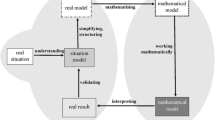Abstract
In the Netherlands, mathematical modelling has become a major subject in the higher secondary education curriculum. However, it is absent from the greater part of lower secondary education. To improve the vertical coherence in the curriculum, this study explores the mathematical modelling proficiency in both primary school and lower secondary school. Additionally, this study also gains insight into the difficulties that students encounter while solving modelling tasks. The study includes two modelling tasks on three difficulty levels for 248 learners ranging from 11 to 15 years old. At each level, learners encounter difficulties when constructing a meaningful representation of the described modelling problem or may even fail to understand the problem. These representation problems are qualitatively analysed and are shown to be partially related to learners’ language problems.
Access this chapter
Tax calculation will be finalised at checkout
Purchases are for personal use only
Similar content being viewed by others
References
Blum, W., & Borromeo Ferri, R. (2009). Mathematical modelling: Can it be taught and learnt? Journal of Mathematical Modelling and Application, 1(1), 45–58.
Blum, W., & Leiß, D. (2005). "Filling up"—The problem of independence-preserving teacher interventions in lessons with demanding modelling tasks. In M. Bosch (Ed.), Proceedings of CERME 4 (pp. 1623–1633). Guixol.
Borromeo Ferri, R. (2006). Theoretical and empirical differentiations of phases in the modelling process. ZDM—Mathematical Education, 38(2), 86–95.
Chan, E. C. M., Ng, D. K. E., Widjaja, W., & Seto, C. (2012). Assessment of primary 5 students’ mathematical modelling competencies. Journal of Science and Mathematics Education in Southeast Asia, 35(2), 146–178.
Dewolf, T., Van Dooren, W., & Verschaffel, L. (2011). Upper elementary school children’s understanding and solution of a quantitative problem inside and outside the mathematics class. Learning and Instruction, 21(6), 770–780.
Galbraith, P. (2006). Real world problems: Developing principles of design. In P. Grootenboer, R. Zevenbergen, & M. Chinnappan (Eds.), Identities, cultures and learning spaces (pp. 229–236). Adelaide: MERGA.
Galbraith, P., & Stillman, G. (2001). Assumptions and context: Pursuing their role in modeling activity. In J. Matos, W. Blum, S. K. Houston, & S. P. Carreira (Eds.), Modelling and mathematics education (pp. 300–310). Chichester: Horwood Publishing.
Kaiser, G., Blomhøj, M., & Sriraman, B. (2006). Towards a didactical theory for mathematical modelling. ZDM —Mathematics Education, 38(2), 82–85.
Kaiser, C., & Maaß, K. (2007). Modelling in lower secondary mathematics classroom—Problems and opportunities. In W. Blum, P. Galbraith, H.-W. Henn, & M. Niss (Eds.), Modelling and applications in mathematics education. The 14th ICMI study, (pp. 99–108). New York: Springer.
Korhonen, J., Linnanmäki, K., & Aunio, P. (2012). Language and mathematical performance: A comparison of lower secondary school students with different level of mathematical skills. Scandinavian Journal of Educational Research, 56(3), 333–344.
Leiβ, D., Plath, J., & Schwippert, K. (2019). Language and mathematics-key factors influencing the comprehension process in reality-based tasks. Mathematical Thinking and Learning, 21(2), 131–153.
Maaβ, K. (2006). What are modelling competencies? ZDM —Mathematics Education, 38(2), 113–142.
Plath, J., & Leiss, D. (2018). The impact of linguistic complexity on the solution of mathematical modelling tasks. ZDM —Mathematics Education, 50(1–2), 159–171.
Perrenet, J., & Zwaneveld, B. (2012). The many faces of the mathematical modeling cycle. Journal of Mathematical Modelling and Application, 1(6), 3–21.
Rellensmann, J., Schukajlow, S., & Leopold, C. (2017). Make a drawing. Effects of strategic knowledge, drawing accuracy, and type of drawing on students’ mathematical modelling performance. Educational Studies in Mathematics, 95(1), 53–78.
Seino, T. (2005). Understanding the role of assumption in mathematical modelling: Analysis of lessons with emphasis on ‘the awareness of assumptions.’ In P. Clarkson, A. Downton, D. Gronn, M. Horne, A. McDonough, R. Pierce, & A. Roche (Eds.), Building connections: Theory, research and practice (pp. 664–671). Sydney: MERGA.
Van Eerde, D., & Hajer, M. (2009). The integration of mathematics and language learning in multiethnic schools. In M. César & K. Kumpulainen (Eds.), Social interactions in multicultural settings (pp. 269–296). Rotterdam, Netherlands: Sense Publishers.
Acknowledgements
This research is funded by The Netherlands Organization for Scientific Research (NWO), number 023.009.047.
Author information
Authors and Affiliations
Corresponding author
Editor information
Editors and Affiliations
Rights and permissions
Copyright information
© 2021 The Author(s), under exclusive license to Springer Nature Switzerland AG
About this chapter
Cite this chapter
Göksen-Zayim, S., Pik, D., Dekker, R., van Boxtel, C. (2021). Mathematical Modelling in Dutch Lower Secondary Education: An Explorative Study Zooming in on Conceptualization. In: Leung, F.K.S., Stillman, G.A., Kaiser, G., Wong, K.L. (eds) Mathematical Modelling Education in East and West. International Perspectives on the Teaching and Learning of Mathematical Modelling. Springer, Cham. https://doi.org/10.1007/978-3-030-66996-6_19
Download citation
DOI: https://doi.org/10.1007/978-3-030-66996-6_19
Publisher Name: Springer, Cham
Print ISBN: 978-3-030-66995-9
Online ISBN: 978-3-030-66996-6
eBook Packages: EducationEducation (R0)



